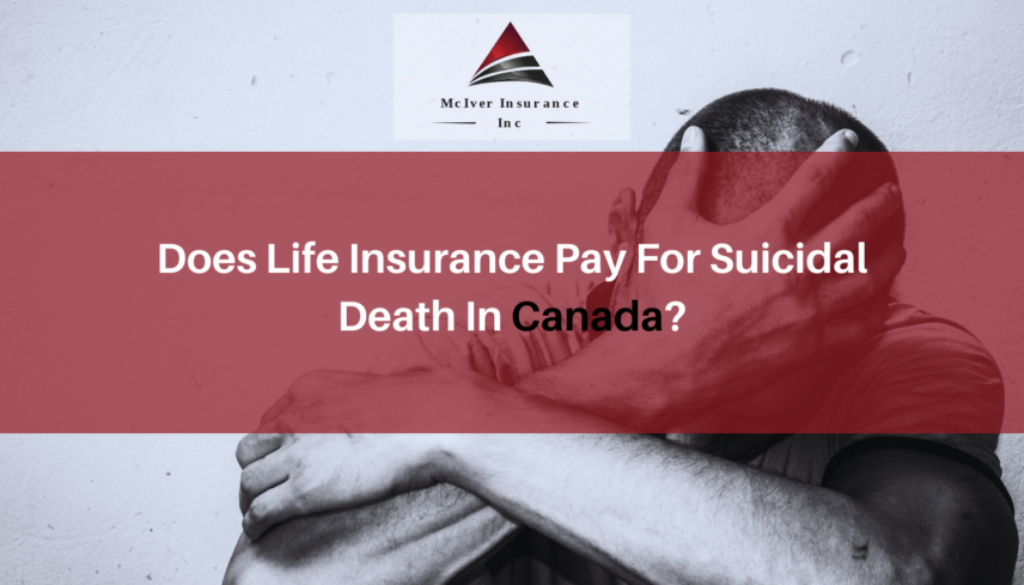Does Life Insurance Pay For Suicidal Death In Canada?
Canadians are looking deeper into specific aspects of life insurance due to volatile international economic conditions. Every person wants to secure their monthly budget and leave behind a sense of financial security for their loved ones.
Canadians purchase life insurance to leave behind funds and resources for their loved ones in the event of their demise. But what happens if a life insurance policyholder dies due to suicide? This is a question that many Canadians may have when considering different types of life insurance products and the cost of these products. It is important to ask questions and understand the suicide clause in a life insurance policy, as this will affect the death benefit payout in such cases. In this blog, we will cover everything you need to keep in mind as it relates to life insurers, the application process, claims, risk, and important factors applicants need to take notice of.
Table of Contents
What Is Life Insurance?
Life insurance is a contract between an insurance provider and a policyholder. The insurer agrees to pay an agreed amount of compensation, known as the death benefit, to the policyholder’s beneficiaries in the event of certain conditions within a given duration. The precondition is the policyholder’s death, and the time period is the validity of the life insurance policy. In return, the policyholder agrees to pay premiums to the insurers to ensure the legitimacy of the life insurance benefits contract.
There are different types of life insurance policies offered by different insurance companies, and the policyholder can choose a plan that best fits their needs and circumstances.
Life insurance covers many different sections or articles in the contract, and each section is a condition that both parties must agree on for the life insurance contract. Some articles of life insurance contracts include coverage amount, beneficiary names, type of policy, duration of the policy, conditions for repayment of loans, and coverage for funeral expenses. The policyholder provides the answer to some of these articles in the contract. The insurance company establishes the terms and conditions of the life insurance contract.
The insurer has a legal obligation to fulfill the life insurance contract provided that the policyholder continues to pay the current premiums. A whole life insurance policy is valid for as long as the policyholder is alive. Beneficiaries of a whole life insurance policy get compensation, the death benefit, whenever the policyholder passes away as long as all the premium payments are up-to-date.
Suicide In Canada
Suicides are the second leading cause of death for people between the ages of 15 and 34 and the ninth leading cause of death overall in Canada. Every year about 4,000 people die as a result of suicide in Canada. Approximately 11 people die of suicide every day in Canada. According to the statistics, men in Canada are more likely to die of suicide in comparison to women.
The Criminal Code in Canada introduced in 1892 mentioned that suicide and assisted suicide are criminal offences. In 1972 suicide was decriminalized, but according to Section 241(b), assisted suicide is still illegal. Anyone found guilty of helping someone take their own life is liable to up to 14 years in prison. It is a subject of debate in federal and provincial legislatures whether physician-assisted suicide is illegal for individuals who can not perform physically without assistance.
Suicide Statistics in Canada
- According to the Canadian Life and Health Insurance Association, over 95% of life insurance policies in Canada cover death by suicide.
- In 2018, suicide accounted for 11.5% of all deaths in Canada.
- In 2018, suicide was the second leading cause of death among Canadians aged 15-34.
- In 2018, the highest suicide rate in Canada was in Nunavut, at 85.2 deaths per 100,000 people.
- In 2018, the lowest suicide rate in Canada was in Prince Edward Island, at 8.6 deaths per 100,000 people.
- In 2018, the suicide rate among males in Canada was three times higher than the rate among females.
- In 2018, the suicide rate among Indigenous Canadians was three times higher than the rate among non-Indigenous Canadians.
The Opposing Views Between Assisted Suicide & Euthanasia
Assisted suicide is an active approach to help someone commit suicide. For example, assisted suicide is when a physician informs or provides lethal drugs to an individual who ends up killing themself. Without the physician’s information, the person would not commit suicide. The person committed suicide with the voluntary intention to do so.
Euthanasia is when family members or doctors intervene to cause the death of an individual to put an end to their suffering. The decision of the family members or doctors is the cause of the death of the person. For example, a person is in a constant state of unconsciousness undergoing permanent medical treatment because their body can not function without medical procedures. Family members or doctors intervene to discontinue the medical treatment because there is no chance of the individual recuperating.
Euthanasia would still be the case if the person is in a semi-conscious state and concedes to end the medical treatment that would prolong their life.
In both cases, the life insurance company may not pay the death benefit because it is not a natural death. The insurance company may consider the death as a suicide or an act of self-harm. Life insurance companies have suicide clauses in their policies that state that if the policyholder dies within a certain period of time after the policy was issued, the death benefit will not be paid. This is to protect the insurance company from any potential fraud or abuse of the policy.
What Is A Medically Assisted Death?
June 17, 2016, the MAID Act sets out conventional procedures and eligibility conditions for individuals seeking medically assisted suicide. The first condition is that the individual must be at least 18 years of age. The second condition is that the person must have a “grievous and irremediable medical condition” which causes “enduring physical or psychological suffering that is intolerable.” In addition, the individual should be in an “advanced state of irreversible decline” for which “natural death has become reasonably foreseeable.”
March 17, 2021, was the first time the Medical Assistance In Dying (MAID) legislation became law. The individual’s death does not need to be reasonably foreseeable for a person to seek medical assistance in dying. It also outlines specific medical and constitutional requirements that need to be met before the person can legally seek medical assistance in dying. Individuals with a mental illness can not seek medical assistance in dying.
How are suicide claims handled by life insurance companies in Canada?
In Canada, life insurance companies handle suicide claims similarly to other death claims. The beneficiary of the life insurance policy is still eligible to receive the death benefit payout, however, the process may vary depending on the specific circumstances and the terms outlined in the insurance policy.
It is important for individuals to understand the suicide clause in their life insurance policy and ask questions about any potential restrictions or exclusions. Life insurance companies typically require a police report and a death certificate as proof of death due to suicide. It is also vital to note that in some cases, a waiting period may apply for suicide claims.
Individuals need understand their options and the costs associated with different types of life insurance policies to ensure that their beneficiaries are protected in the event of their passing. Overall, life insurance companies offer the same services and options for beneficiaries in the event of a suicide claim as they do for any other death claim.
Does Life Insurance Pay For Suicidal Death In Canada?
The main factor that influences the answer to the question is the duration the life insurance policy has been in place. Life insurance providers will not compensate beneficiaries if the suicidal death takes place in the first two years of the policy. In such a case, life insurance providers return the paid premiums. After the first two years of the policy, life insurance providers treat the suicidal death like any other death and provide compensation to the beneficiaries.
Life insurance providers reserve the right to investigate a claim after the death of the policyholder. Life insurance providers have a keen eye for any misrepresentations made when purchasing the policy. Life insurance providers can deny a claim if they find that there was a misrepresentation to declare a history of mental instability or depression by the policyholder.
Insurance Payouts For A Medically Assisted Death
All life insurance providers treat medically assisted deaths in the same way. Life insurance providers provide full compensation if the policyholder dies a medically assisted death regardless of how long the policy has been in place. The key to remember is that all of the conditions of a medically assisted death must be met by the policyholder to differentiate this death from suicide.
Consult A Professional Insurance Broker
McIver Insurance can help you make sense of the exact kind of life insurance policies you need based on your situation. They understand all of the exclusionary clauses that life insurance providers can have, and strive to find a life insurance policy based on your specific requirements.
We recommend individuals seeking to purchase a new life insurance policy consult with a McIver insurance broker to fully understand how the life insurance policy plays out in their best interest. A consultation does not mean that you are obligated to make any commitments. Seeking professional advice can help you save time and money! If you are seeking a quote, we can also put you on the right path for your goals and objectives.



